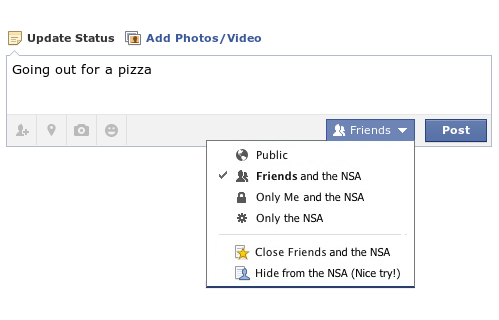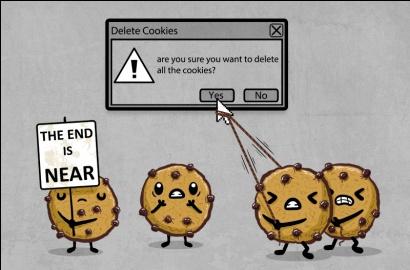Cookies: Frequently Asked Questions

A cookie is a piece of information in the form of a very small text file that is placed on an internet user's hard drive. It's generated by a web server, which is basically a computer that hosts a website. The information the cookie contains is set by the server and it can be used by that server whenever the user visits the website. A cookie can be thought of as an internet user's identification card, which tells a website when the user has returned.
Below is the content of a typical cookie. This one is from the Hotmail service and has the filename jss@hotmail.msn.txt (.txt is the standard filename extension for text files):
HMP1 1 Hotmail.msn.com/ 0 1715191808 32107852 1236821008 29449527 *
The codes will only make sense to Hotmail servers.
Internet cookies were originally developed in 1995 by the Netscape Communications Corporation. The word 'cookie' comes from 'magic cookie', a term in programming languages for a piece of information shared between cooperating pieces of software. The choice of the word 'cookie' appears to come from the American tradition of giving and sharing edible cookies.
Cookies make the interaction between users and websites faster and easier. Without cookies, it would be very difficult for a website to allow a visitor to fill up a shopping cart or to remember the user's preferences or registration details for a future visit.
Websites use cookies mainly because they save time and make the browsing experience more efficient, but cookies are also used to collect demographic information about their users. Cookies enable websites to monitor their users' websurfing habits and profile them for marketing purposes, for example to find out which products or services they are interested in to send them targeted advertisements.
Like regular cookies, internet cookies come in different flavors:
Session, or transient cookies
Cookies that are stored in the computer's memory only during a user's browsing session and are automatically deleted from the user's computer when the browser is closed.
These cookies usually store a session ID that is not personally identifiable to users, allowing the user to move from page to page without having to login repeatedly. They are widely used by commercial websites (for example, to keep track of items that a consumer has added to a shopping cart).
Session cookies are never written on the hard drive and they do not collect any information from the user's computer. Session cookies expire at the end of the user's browser session and can also become inaccessible after the session has been inactive for a specified length of time, for example 20 minutes.
Permanent, persistent, or stored cookies
Cookies that are stored on the user's computer and are not deleted when the browser is closed. Permanent cookies can retain user preferences for a particular website, allowing those preferences to be used in future browsing sessions.
Permanent cookies can be used to identify individual users, so they may be used by websites to analyze users' surfing behaviour within the website. These cookies can also be used to provide information about numbers of visitors, the average time spent on a particular page and generally the performance of the website. They are usually configured to keep track of users for a prolonged period of time, in some cases many years into the future.
Flash cookies
If you have Adobe Flash installed on your computer (most computers do), small files may be stored on your computer by websites that contain Flash media, such as video clips. These files are known as Local Shared Objects (LSOs) or Flash cookies. They can be used for the same purposes as regular cookies (properly called HTTP cookies).
Flash cookies can also back up the data that is stored in a regular cookie. When you delete cookies using your browser controls, your Flash cookies are not affected. So a website that placed a cookie on your computer may recognize it during your next visit, if it backed up its deleted cookie data to a Flash cookie.
You can control Flash cookies. Adobe's website offers tools to control Flash cookies on your computer and users of the Firefox browser can also get an add-on to detect and delete Flash cookies.
No. Cookies are small pieces of text. They are not computer programs and they can't be executed as code. They cannot be used to disseminate viruses and website visitors can delete cookies from their computer and other devices and/or set their own limitations to the number of cookies saved on their hard drives.
Cookies are stored on the computer's hard drive. They cannot access the hard drive so a cookie can't read other information saved on the hard drive, or get a user's e-mail address etc. They only contain and transfer to the server as much information as the users themselves have disclosed to a certain website.
A server cannot set a cookie for a domain that it's not a member of. In spite of this, users quite often find cookies in their computer files from websites that they have never visited. These cookies are usually set by companies that sell internet advertising on behalf of other websites. Therefore it may be possible that users' information is passed to third party websites without the users' knowledge or consent, such as information on surfing habits. This is the most common reason for people to reject cookies.
Recommended Viewing: Why Privacy Matters
Related: Facebook's Future Plans for Data Collection Beyond All Imagination
Facebook's future Privacy options:

Source for cookies info: aboutcookies.org
